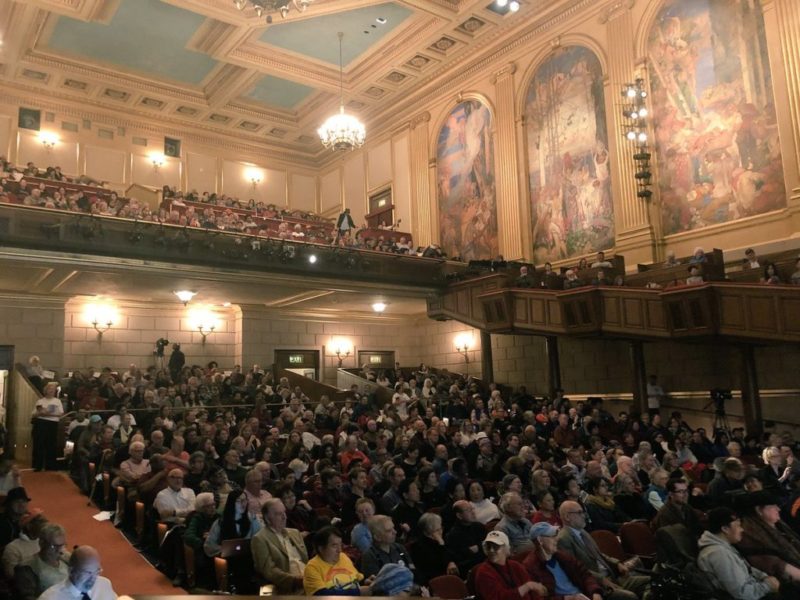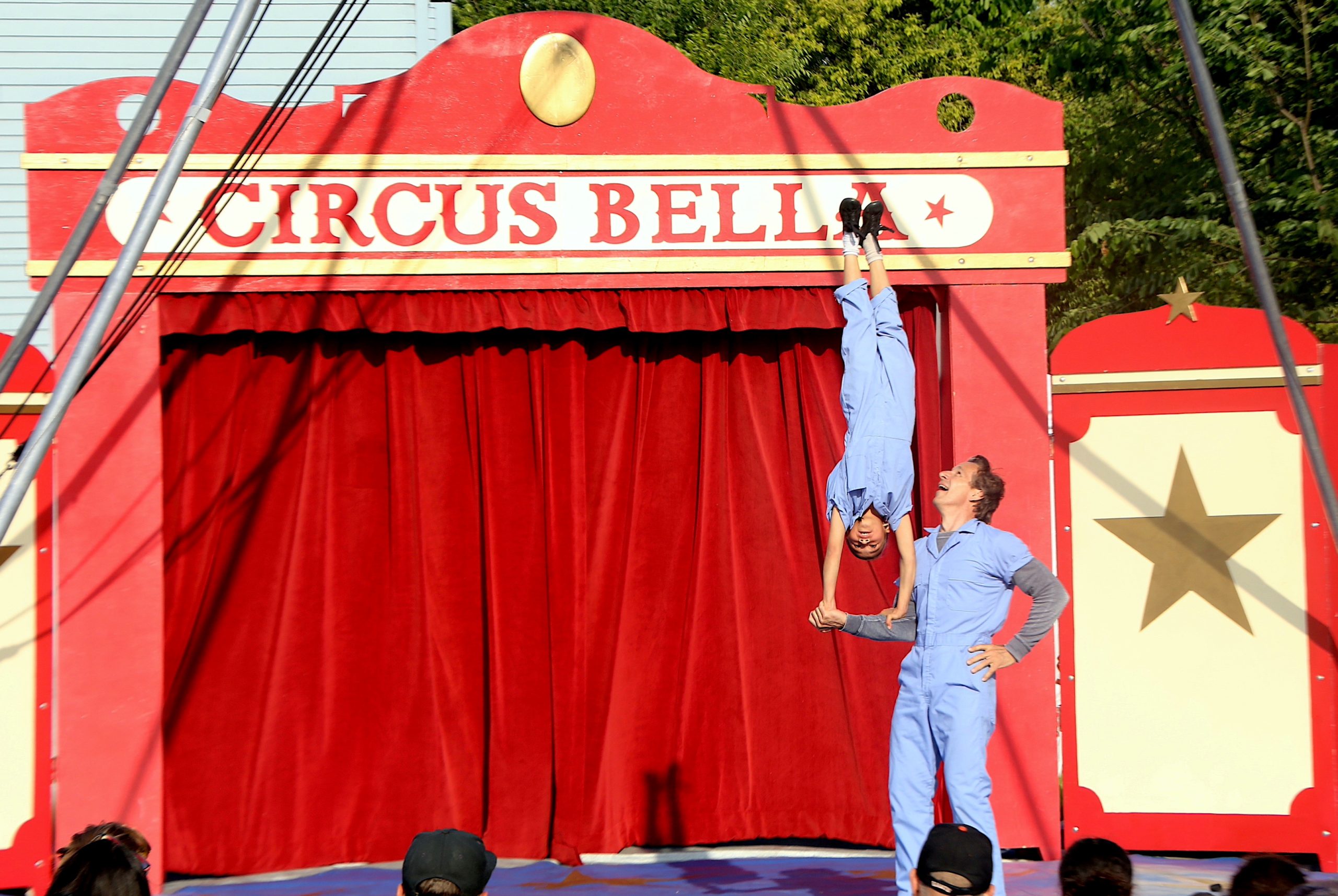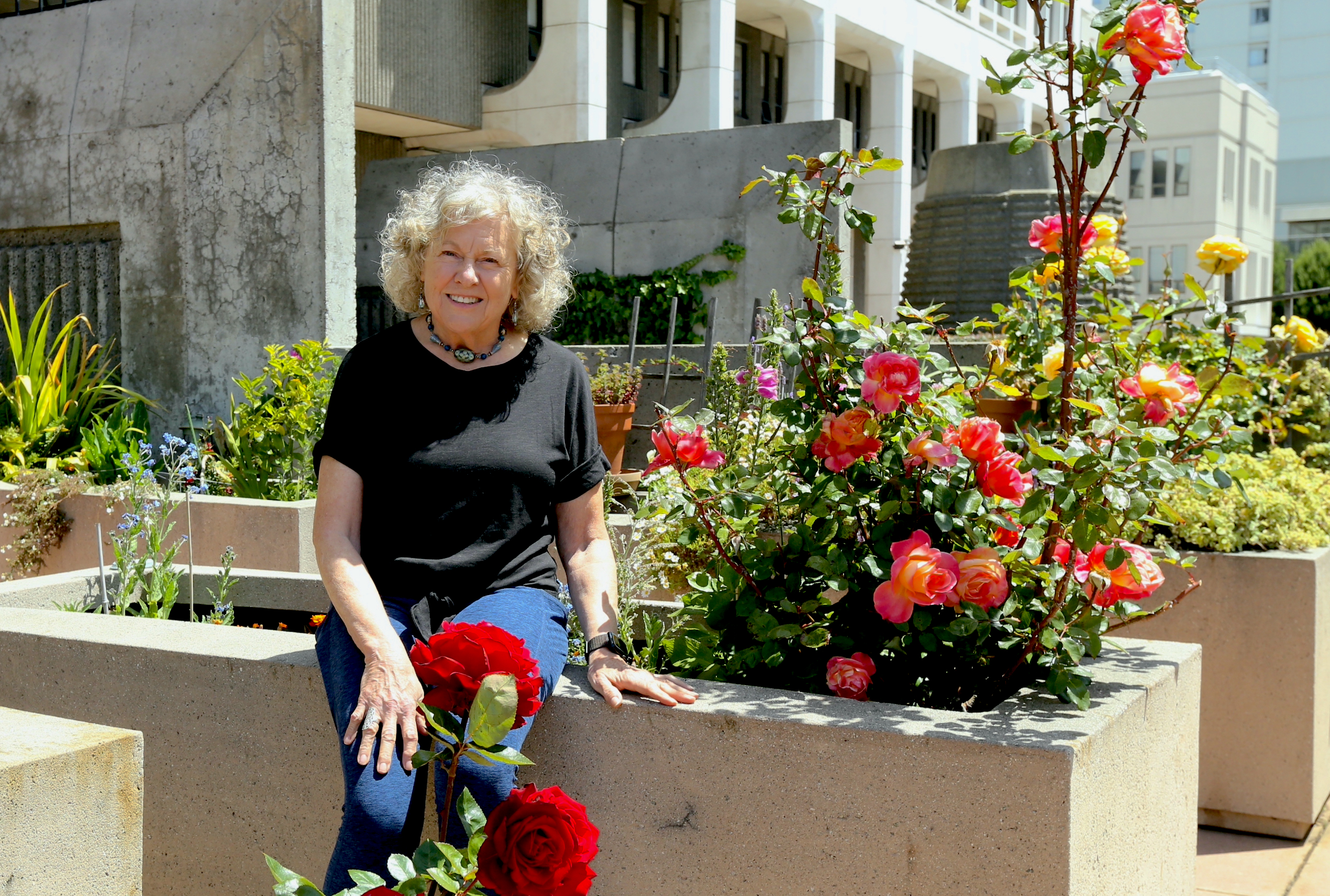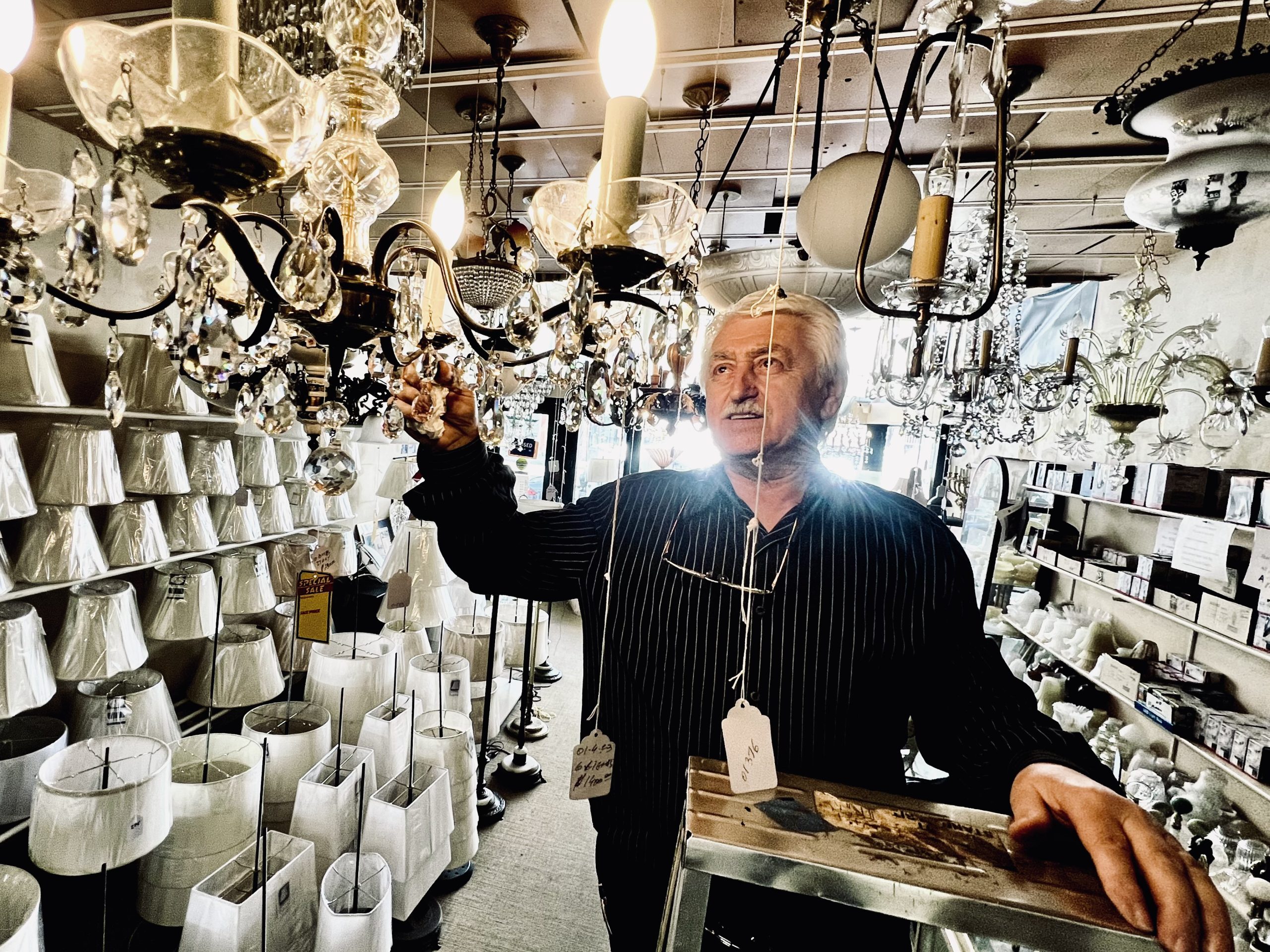Mayoral candidate forum draws record crowd of seniors and adults with disabilities
EDITOR’S NOTE – Senior Beat Staffer Judy Goddess contributed to this report.
In wheelchairs and on foot, navigating with canes and guided by seeing-eye dogs, they funneled through the Herbst Theatre’s narrow entranceways to fill its venerable auditorium in April. Candidates for San Francisco mayor were going to answer their questions.
 Adults with a variety of physical challenges were among almost a thousand of the city’s nearly 220,000 seniors – a quarter of the total population – who packed in for the first-ever mayoral forum focused on their needs. Sponsored by the San Francisco Dignity Fund Coalition of more than 40 nonprofit advocacy groups, it was also one of the most accessible.
Adults with a variety of physical challenges were among almost a thousand of the city’s nearly 220,000 seniors – a quarter of the total population – who packed in for the first-ever mayoral forum focused on their needs. Sponsored by the San Francisco Dignity Fund Coalition of more than 40 nonprofit advocacy groups, it was also one of the most accessible.
People in wheelchairs took up the first two rows. Those who were deaf or hard of hearing were offered American Sign Language interpretation and Assisted Listening devices. Non-English speakers could hook up to live interpretation in Spanish and Cantonese via wireless headsets.
“When planning large community events, it is important to consider all aspects of access. From wheelchair access of the venue to the need for language access. It all factored into the planning of the event,” said Coalition Co-Chair Fiona Hinze. “One of the most important, unique aspects of the event was the live stream. This allowed members of our community who were not able to attend in person to participate in the event.”

The event was home-spun – attendees were handed printouts of candidates’ answers to pre-posed questions – but also high-tech. The session was video-taped, live-streamed and live-tweeted. All of which, as well as a closed-captioned record, is on the web at www.sfdignityfund.org/
The candidates’ panel included Attorney Angela Alioto and state Sen. Mark Leno, both former San Francisco supervisors, and current supervisors London Breed and Jane Kim. Only those consistently reaching 6 percent or more in political polls were invited. Other mayoral hopefuls in the auditorium were invited to introduce themselves before the forum got underway.

Moderator Yomi Wrong, manager of the Adults with Disabilities Act compliance program for Sutter Health’s Peninsula Coastal Region, posed questions from the organizers as well as ones the audience posted online or wrote on cards. But with a slate of candidates all on the progressive end of the scale, some in the audience found it tough to name a winner. “It’s hard to get the candidates to differentiate,” said Diane Jones. And as another said, “We’re in good hands, whoever wins.”
Challenges to the Dignity Fund
One of the first questions out of the box dealt with the Dignity Fund, which could face a challenge on the November ballot. Created in 2016 by Proposition I, it was marshalled by the Dignity Fund Coalition and approved by more than two-thirds of voters. it guarantees annual baseline fiscal support for services for seniors and adults with disabilities. Inaugurated at existing funding levels of $38 million plus $6 million in new allocations, the fund is now in a set-aside budget protected from cuts and guaranteed future increases.
Due to San Francisco’s increased cost of living, 57 percent of seniors and adults with disabilities now lack basic economic security, coalition members said. And with this population projected to grow, they’re concerned.

But the candidates all strongly dispelled any notion they would do anything to weaken the fund. Alioto, who has represented many clients in Adults with Disabilities Act cases, compared the Dignity Fund to the city’s landmark 1991 Children’s Fund, which she championed. Kim, a former Board of Education member, said that despite reservations about set-aside budgets, “I’ve seen over and over again that certain stakeholders will lose when there’s not a dedicated funding stream.”
Leno reported he had already talked to Supervisor Aaron Peskin about dropping his plans to put the measure on the November ballot.

“Every day, members of the Dignity Fund Coalition experience how much difficulty seniors and adults with disabilities face in trying to make ends meet – and that is before they need home care and other services to be able to stay in their own homes,” said Coalition Co-Chair Marie Jobling, who is executive director of the San Francisco Community Living Campaign. While one of the candidates will become mayor, they will all remain community leaders and I was heartened by their remarks.”
Vanishing bus stops and boarded up businesses
Candidates were asked a variety of questions concerning seniors and adults with disabilities: housing shortages and evictions, the fear of homelessness – or the homeless, street and sidewalk safety, and the availability of long-term care. And they were asked what makes a city livable, and if San Francisco is living up to that.

“I’ve never seen the City as bad off as it is today,” said Alioto. “Boarded up businesses – small business is the backbone of the city and they’re closing down.” The planned removal of some Geary Boulevard bus stops, which many seniors and disabled depend on, to create a fast lane is just one example of how “the elderly are being ignored” by city government, she said.
She would create coalitions of citizens to get involved in finding solutions. Under her tenure as supervisor, funds were created to provide services for the chronically homeless, including a needle exchange program. That money, she said, has since “moved to the new people coming into town with all the new businesses. Now, the streets are dirty and there’s no place to put the homeless.”
Many homeless could be pulled off the streets and put in treatment facilities if legislation to expand the California Conservatorship law passes. Candidates concurred on the dire situation of many homeless but placed heavy emphasis on protecting their civil rights. SB-1045 would grant local governments flexibility to consider conservatorship for people with debilitating mental illness, severe drug addiction, repeated psychiatric commitments, or excessively frequent use of emergency medical services.
“I understand some homeless are severely mentally ill, but that doesn’t mean you should be conserved 24/7. It needs to be examined by a judge case by case,” said Alioto. The law actually requires counties to opt in, Breed said, but noted a guardian can petition every 30 days for a person’s release. As long as there’s a guarantee of counsel for the individual, Kim said, “This is about getting people we see every day who are struggling help rather than letting them die on the street.”
She and Leno agreed that such a change would do no good until the City increases its number of treatment beds.
It’s all about affordability

Breed said better outreach is needed to identify seniors in need and make sure they have adequate housing and help. She said she has pushed back on developers to provide more affordable housing and pushed for repairs to existing buildings. Raised by her grandmother in public housing, she recalled the lack of an elevator and the challenge of filling out forms to get services. “It was frustrating. So many seniors who live alone don’t quality for services. We need to make sure they get them.”
For Kim, general affordability is the City’s over-arching problem. “I’m proud to live in a sanctuary city, and one that has free city college, but the most progressive policies in the world don’t matter if people can’t afford to live here.” She would pour more money into housing, education, transportation and health care.

In one effort to impact affordability, Kim is urging the Metropolitan Transportation Commission, on which she sits, for a regional pass for low-income households. It’s a follow-up to her efforts in getting low-income seniors and those with disabilities free rides on Muni buses, and making City College tuition free for all residents, including seniors who want to enroll in credit courses. She worked for improvements in subsidized housing, such as mandating grab bars in showers, and a revolving loan fund to fix elevators in Tenderloin housing. She has challenged low-fault evictions and supports the right of tenants to counsel during eviction.
‘Vitality victory over senior tsunami’
Calling for a mindset of “vitality victory over senior tsunami,” Leno envisioned a city that’s “senior welcoming, with services that lead the way for the rest of the country.” He would expand local hiring, tapping seniors with valuable experience, and further educational opportunities. He helped funnel state money to save the foundering City College and make it free, something he’d like to do at San Francisco State as well.
The California Congress of Seniors gave Leno a 100 percent rating for his support of a host of beneficial legislation: increasing nursing home staff hours per patient, expanding exemptions to seniors in bankruptcy, creating an Aging and Long-term Care Services Coordinating Council, and a three-year tax on managed care organizations to help fund Medi-Cal, among others. He also fought to exempt from Ellis Act evictions single room occupancy units, often the last option for many low-income individuals, including many seniors and the disabled.

”It’s unfortunate that in San Francisco we can’t take for granted life’s basics: food, clothing, shelter,” he said. “I’m reminded that when someone loses their home due to the no-cause Ellis Act – 70-year-old men who have survived an epidemic [AIDS] for 35 years are losing their homes – but also access to medical care, pharmacies and all the support networks that sustain them.”
In-home and long-term care
Candidates were asked for their ideas on how to make in-home and long-term care services more affordable and what to do about the shortage of workers.
Leno would make permanent a pilot project of the Department of Aging and Adult Services’ and the Institute on Aging, Support at Home, that offers vouchers to middle-income seniors and adults with disabilities who are not eligible for other subsidized home care programs. Establishing career ladders and tiered wages would help attract and retain home-care workers, he said, pointing out the career pathways and training programs for care providers at Homebridge in San Francisco.
Kim lead the fight to include home-care workers in the city’s new $15 minimum wage. Now, she and Breed are urging an hourly addition of $1.86 in their paychecks. “This industry is going to be growing and we need to make these livable wage jobs,” said Kim.
Breed recalled the caregiver who tended to her grandmother when she developed Alzheimer’s. “It is backbreaking work – at the time for less than $10 an hour. I truly believe they deserve to be paid a lot more.” She proposed setting up a task force, using resources like the Dignity Fund, to support care at home or in a long-term facility.
Alioto would look at regulations she said make it hard to even get in-home health care. When her brother was sick last year, she said, “long-term care was incredibly difficult because MediCal had so many restrictions.” She also supports creating housing for workers so they are not traveling miles from they live. She referenced housing built within walking distance of a San Jose hospital where nurses pay rent based on their salary. “We need more programs like that.”
Cars, guns and scooters
More people are killed by cars than guns in San Francisco, said Kim. Asked how to make streets and sidewalks safer for pedestrians, she said the city should focus on the 13 percent of city streets that account for 75 percent of all injuries and deaths. All the candidates endorsed stricter speed enforcement, additional camera monitors and crosswalk modifications. “I know people are frustrated by bulb-outs, but they’ve proven to save lives,” said Breed.
All the candidates were aghast at the recent flash flood of app-operated scooters dropped on San Francisco streets and sidewalks by enterprising start-ups. They pose a danger to anyone navigating city sidewalks, they said. “You hear them coming behind you, all you can think about is your ankles,” said Alioto. “It boggles my mind that the tech industry would go over city government. No one got permission.” All agreed: Regulations are needed.
Which approaches the City takes toward ensuring adequate care of seniors and those with disabilities will be clearer after June 5. The special election is being held to fill the vacancy held by former Mayor Ed Lee, who died of a heart attack in December.





